Print this Page
African British Connection
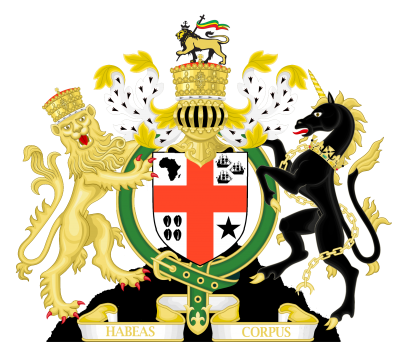
[su_spoiler title=”BACKGROUND” style=”fancy” icon=”plus-square-1″][su_tabs][su_tab title=”TABS”] Click on the TABS to the right to get an overview of the African British Connection Campaign. [/su_tab] [su_tab title=”WHAT”]
Click on the TABS to the right to get an overview of the African British Connection Campaign. [/su_tab] [su_tab title=”WHAT”] WHAT?:- The African British Connection Campaign is a project that seeks to propagate for the use of the term African British or African British- ? (Caribbean, Nigerian, Mixed etc.) as an ethnic code to be used by people of African descent who were born or who are British citizen. .[/su_tab] [su_tab title=”WHO”]
WHAT?:- The African British Connection Campaign is a project that seeks to propagate for the use of the term African British or African British- ? (Caribbean, Nigerian, Mixed etc.) as an ethnic code to be used by people of African descent who were born or who are British citizen. .[/su_tab] [su_tab title=”WHO”] WHO?:- All people of direct African descent born in Britain or living in Britain with British Citizenship, currently referred to as Black British, Afro-Caribbean, Caribbean, African Caribbean, African, Mixed Caribbean or Africans with Ethnic Europeans.[/su_tab] [su_tab title=”AIM”]
WHO?:- All people of direct African descent born in Britain or living in Britain with British Citizenship, currently referred to as Black British, Afro-Caribbean, Caribbean, African Caribbean, African, Mixed Caribbean or Africans with Ethnic Europeans.[/su_tab] [su_tab title=”AIM”] AIMS:- To campaign within and amongst the African-Caribbean, Black British, British African, Caribbean and Mixed/Dual Heritage communities and people throughout the United Kingdom, to adopt African British/Caribbean as a universal Ethnic category description when self-classifying on forms or when participating in surveys or other statistical collecting exercises.[/su_tab] [su_tab title=”OBJECT”]
AIMS:- To campaign within and amongst the African-Caribbean, Black British, British African, Caribbean and Mixed/Dual Heritage communities and people throughout the United Kingdom, to adopt African British/Caribbean as a universal Ethnic category description when self-classifying on forms or when participating in surveys or other statistical collecting exercises.[/su_tab] [su_tab title=”OBJECT”] OBJECTIVE:- To ensure that current and all future people of direct African descent born or residing as a citizen within the United Kingdom share in a positive identity that reflects, reinforces and strengthens their connection to African, British & Caribbean cultural heritage. This is hoped to establish a platform and create the vehicle upon which a cohesive cultural identity can be firmly established that truly reflects this unique heritage, its cultural aspirations and expressions that currently exists, here in Britain today.[/su_tab] [su_tab title=”WHEN”]
OBJECTIVE:- To ensure that current and all future people of direct African descent born or residing as a citizen within the United Kingdom share in a positive identity that reflects, reinforces and strengthens their connection to African, British & Caribbean cultural heritage. This is hoped to establish a platform and create the vehicle upon which a cohesive cultural identity can be firmly established that truly reflects this unique heritage, its cultural aspirations and expressions that currently exists, here in Britain today.[/su_tab] [su_tab title=”WHEN”] WHEN IT STARTED?:- Although Imani has over many years been campaigning for the use of the term African British as a self-classification for African people in Britain, this has mostly been on a local and personal level, i.e. friends and family, personally he has used this term in self-classifying himself on forms over the past 15 years . Officially however as part of Imani’s public Activism, this term through this campaign was actually Launched on August 1st 2014, to mark and commemorate exactly 100 years, from the founding of the U.N.I.A (Universal Negro Improvement Association), in 1914 by the Rt. Hon. Marcus M. Garvey.[/su_tab] [su_tab title=”WHERE”]
WHEN IT STARTED?:- Although Imani has over many years been campaigning for the use of the term African British as a self-classification for African people in Britain, this has mostly been on a local and personal level, i.e. friends and family, personally he has used this term in self-classifying himself on forms over the past 15 years . Officially however as part of Imani’s public Activism, this term through this campaign was actually Launched on August 1st 2014, to mark and commemorate exactly 100 years, from the founding of the U.N.I.A (Universal Negro Improvement Association), in 1914 by the Rt. Hon. Marcus M. Garvey.[/su_tab] [su_tab title=”WHERE”] WHERE?:- Imani’s intention and campaigning strategy will be implemented and propagated throughout Britain, beginning in Birmingham, Sandwell & The Black Country, although simultaneously targeting African – Caribbean – Mixed, people and their respective communities throughout the United Kingdom.[/su_tab] [su_tab title=”HOW”]
WHERE?:- Imani’s intention and campaigning strategy will be implemented and propagated throughout Britain, beginning in Birmingham, Sandwell & The Black Country, although simultaneously targeting African – Caribbean – Mixed, people and their respective communities throughout the United Kingdom.[/su_tab] [su_tab title=”HOW”] HOW?:- The ABC Campaign will be implemented through a series of vehicles that include, educational resources such as; Exhibitions, displays and other education products; Focused community projects and events, including street canvassing throughout the United Kingdom; Through different media mediums, i.e. radio, video’s, music social, news, e.t.c. Imani will try to engage all the available resources, utilise all avenues to his fullest capacity to ensure that this campaign, achieves maximum exposure and support throughout Britain and across the globe. [/su_tab][/su_tabs][/su_spoiler]
HOW?:- The ABC Campaign will be implemented through a series of vehicles that include, educational resources such as; Exhibitions, displays and other education products; Focused community projects and events, including street canvassing throughout the United Kingdom; Through different media mediums, i.e. radio, video’s, music social, news, e.t.c. Imani will try to engage all the available resources, utilise all avenues to his fullest capacity to ensure that this campaign, achieves maximum exposure and support throughout Britain and across the globe. [/su_tab][/su_tabs][/su_spoiler]
[su_spoiler title=”THE CAMPAIGN & PROGRAMME” style=”fancy” icon=”plus-square-1″][su_tabs][su_tab title=”TABS”] Click on the TABS to the right to to Learn More About the African British Connection Campaign & Programme[/su_tab] [su_tab title=”INTRO”]
Click on the TABS to the right to to Learn More About the African British Connection Campaign & Programme[/su_tab] [su_tab title=”INTRO”]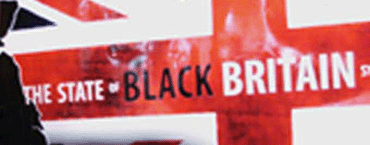 People of African descent born in Britain, particularly the young and those who’s parents or parent recently came from the Caribbean, have for more than a generation struggled with their cultural and ethnic identity. This is no more evident and demonstrated than when they are filling in forms that require an ethnic code. Even though many do maintain the terminology used to identify their parents and grandparents, i.e.
People of African descent born in Britain, particularly the young and those who’s parents or parent recently came from the Caribbean, have for more than a generation struggled with their cultural and ethnic identity. This is no more evident and demonstrated than when they are filling in forms that require an ethnic code. Even though many do maintain the terminology used to identify their parents and grandparents, i.e. 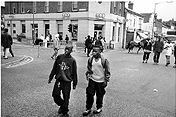 Afro-Caribbean, or African Caribbean, some first generation and the vast majority of the now second & third generation born in Britain, no longer ascribe to this classification or terminology and currently use the terms Black British, Caribbean British, Black Caribbean and sometimes simply British. Many also leave this question blank entirely. This makes it difficult to gather easily statistical information in relation to this subject group, in order to better identify gaps, inequalities or better implement targeted strategies to address some of their specific issues. According to the Office for National Statistics, at the 2001 census there were over a million black people in the United Kingdom; 1% of the total population described themselves as “Black Caribbean”, 0.8% as “Black African”, and 0.2% as “Black other”[/su_tab] [su_tab title=”NEED”]
Afro-Caribbean, or African Caribbean, some first generation and the vast majority of the now second & third generation born in Britain, no longer ascribe to this classification or terminology and currently use the terms Black British, Caribbean British, Black Caribbean and sometimes simply British. Many also leave this question blank entirely. This makes it difficult to gather easily statistical information in relation to this subject group, in order to better identify gaps, inequalities or better implement targeted strategies to address some of their specific issues. According to the Office for National Statistics, at the 2001 census there were over a million black people in the United Kingdom; 1% of the total population described themselves as “Black Caribbean”, 0.8% as “Black African”, and 0.2% as “Black other”[/su_tab] [su_tab title=”NEED”] The need for change:- Although Black British seems to be the terminology generally accepted by the majority of British born people of African descent and is used and accepted as a self-classification code for national U.K statistical purposes. This accepted term nevertheless has no actual basis in ethnicity and further aims to contribute to this cultural identity crisis if persisted unchallenged. Legally speaking, the term Black British can rightly be applied to people of African descent, but likewise could also be equally applied in reference to a person of Asian background, or any person of a none-white background, excepting the Irish who have in the past, although being ethnically European’s themselves, have also been categorised under the term black.
The need for change:- Although Black British seems to be the terminology generally accepted by the majority of British born people of African descent and is used and accepted as a self-classification code for national U.K statistical purposes. This accepted term nevertheless has no actual basis in ethnicity and further aims to contribute to this cultural identity crisis if persisted unchallenged. Legally speaking, the term Black British can rightly be applied to people of African descent, but likewise could also be equally applied in reference to a person of Asian background, or any person of a none-white background, excepting the Irish who have in the past, although being ethnically European’s themselves, have also been categorised under the term black.
Furthermore there seems to be a nation-wide confusion about ethnicity and what it actually means or represents. .[/su_tab] [su_tab title=”ETHNICITY”]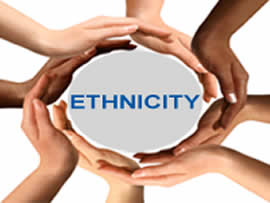 What is ethnicity?:- An ethnicity, or ethnic group, is a socially-defined category of people who identify with each other based on common ancestral, social, cultural, or national experience, (wiki definition).
What is ethnicity?:- An ethnicity, or ethnic group, is a socially-defined category of people who identify with each other based on common ancestral, social, cultural, or national experience, (wiki definition).
A person’s ethnicity is therefore, whatever or whomever a person chooses to identify themselves with. Therefore although not fully understanding what ethnicity means, most people in their confusion often put their, nationality, cultural, social, religious and other affiliations on forms, depending upon the ethnic question being asked, e.g. ethnic origin or group. In truth, any one of the above descriptions, would be sufficient to describe ethnicity. Therefore for most people this offers no real problem whatsoever as they can select from the above categories, e.g. nationality, cultural, social, religious and so on, to associate themselves with. Although for gathering statistical data and quantifying this data, for authorities i.e. the investigator, this can be problematic. Nevertheless it should also be understood and highlighted that central to Ethnicity is peoples notion of Race, the actual word or term that our modern use of the term Ethnic or Ethnicity replaces. This is illustrated by their association with ancestral connections or even a continental classification, such as Asian, European, African and so on. From scientific point of view all people on earth can be categorised under just a few ancestral beginnings or continental headings, from which the rest of groups are a mixed type, incorporated into or under these main headings/categories, which are normally three, notably; African, Asian and European, although Aborigines, Mongolians, Native Indians and many others can be and are often sited as distinct groups, they are also known to be mixed and direct descendents of either two and sometimes all three of these 3 main categories.  Therefore in identifying a person’s ethnicity in regards to Racial or ancestral origins, one has only a handful of categories to select from, none of which include nationality, but rather the continent from which a nation is located e.g. Africa, Europe, America’s, Asia and so on. This being the case, things could be possibly simpler if nationality ethnic origin i.e. racial, cultural and religious questions were asked separately as was the case in the past. Nevertheless this would require people to spend a lot more time filling in a form, something most people would not welcome. It is based upon this understanding of Ethnicity that one can see that the term Black, now been used by people of Caribbean and African descent in Britain, has no relevance or authenticity in regards to Ethnicity or Ethnic origins. Also this also indicates that what is known as Ethnogenesis, the development of a new Ethnic group, is currently emerging within the African – Black communities in Britain. Therefore let us examine how this term Black, has developed within this particular community, to be now used and applied or engaged as a self-classification of ethnicity by its users. [/su_tab] [su_tab title=”BLACK”]
Therefore in identifying a person’s ethnicity in regards to Racial or ancestral origins, one has only a handful of categories to select from, none of which include nationality, but rather the continent from which a nation is located e.g. Africa, Europe, America’s, Asia and so on. This being the case, things could be possibly simpler if nationality ethnic origin i.e. racial, cultural and religious questions were asked separately as was the case in the past. Nevertheless this would require people to spend a lot more time filling in a form, something most people would not welcome. It is based upon this understanding of Ethnicity that one can see that the term Black, now been used by people of Caribbean and African descent in Britain, has no relevance or authenticity in regards to Ethnicity or Ethnic origins. Also this also indicates that what is known as Ethnogenesis, the development of a new Ethnic group, is currently emerging within the African – Black communities in Britain. Therefore let us examine how this term Black, has developed within this particular community, to be now used and applied or engaged as a self-classification of ethnicity by its users. [/su_tab] [su_tab title=”BLACK”]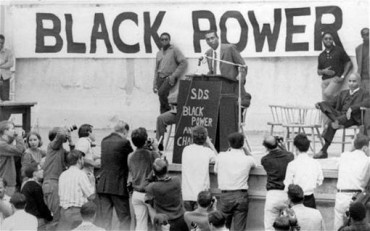 The Term Black:- As things stands, with no separation on forms to identify and differentiate between a persons ethnicity; i.e. culture, religion and nationality and since it is left therefore for people to themselves self classify, without any persuasion or encouragement from the state and government. It is therefore of paramount importance that this terminology Black, in regards to ethnicity of people of African descent be discouraged and totally disbanded, by African’s in Britain as a ethnic classification, as it is not valid neither conducive to a positive identity, other than in reference to skin colour and not literally speaking either, but in the positive identity, given to this term, during the Black Power Movements of the 1960’s and 1970’s.
The Term Black:- As things stands, with no separation on forms to identify and differentiate between a persons ethnicity; i.e. culture, religion and nationality and since it is left therefore for people to themselves self classify, without any persuasion or encouragement from the state and government. It is therefore of paramount importance that this terminology Black, in regards to ethnicity of people of African descent be discouraged and totally disbanded, by African’s in Britain as a ethnic classification, as it is not valid neither conducive to a positive identity, other than in reference to skin colour and not literally speaking either, but in the positive identity, given to this term, during the Black Power Movements of the 1960’s and 1970’s. 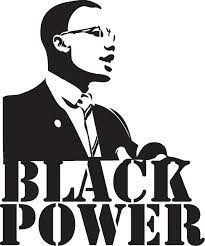 However rather than maintaining its positive influence on people of African descent, the term when applied to ethnicity, is in fact and may already be and will no doubt eventually, have an adverse and negative affect that further separate’s and further alienates the individual using it, from their true identity, ethnic & ancestral origins which is undoubtedly and without question African.
However rather than maintaining its positive influence on people of African descent, the term when applied to ethnicity, is in fact and may already be and will no doubt eventually, have an adverse and negative affect that further separate’s and further alienates the individual using it, from their true identity, ethnic & ancestral origins which is undoubtedly and without question African.
Here it should also be noted that most if not all Negro’s and coloured people who championed and participated in what is now known and remembered, in history as the Black Power Struggles or Movements, resulting in these people proudly referring to themselves as ‘Black’ people, as apposed to the aforementioned 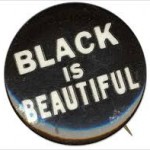 terms, Negro’s and Colored. Who were also using the term Black, purely and specifically in relation to describing their skin colour e.g. be proud to be black, black is beautiful and so on, in opposition to have been referred to by the outdated, none-reflective and even perceived racist terms colored and negro. These self acclaimed Black people at the time and those who emanated from this generation and identity, had no confusion or any anxiety about their ethnic origin and unanimously would have self-classified themselves ethnically as African, as many of them did and continue to do so today, as seen in the Caribbean the U.S. and elsewhere.[/su_tab] [su_tab title=”CRISIS”]
terms, Negro’s and Colored. Who were also using the term Black, purely and specifically in relation to describing their skin colour e.g. be proud to be black, black is beautiful and so on, in opposition to have been referred to by the outdated, none-reflective and even perceived racist terms colored and negro. These self acclaimed Black people at the time and those who emanated from this generation and identity, had no confusion or any anxiety about their ethnic origin and unanimously would have self-classified themselves ethnically as African, as many of them did and continue to do so today, as seen in the Caribbean the U.S. and elsewhere.[/su_tab] [su_tab title=”CRISIS”] The Background to the Cultural Identity Crisis:- It is true that many of those people in question today, who use Black as their ethnic group, code or origin would not classify themselves as African, absolutely not, but baring in mind that neither did or would many of their forbears, after leaving the continent of Africa and being born and brought up in the Caribbean, this of course includes their immediate ancestor and their current older family members, who have migrated to Britain over the past 50 years.
The Background to the Cultural Identity Crisis:- It is true that many of those people in question today, who use Black as their ethnic group, code or origin would not classify themselves as African, absolutely not, but baring in mind that neither did or would many of their forbears, after leaving the continent of Africa and being born and brought up in the Caribbean, this of course includes their immediate ancestor and their current older family members, who have migrated to Britain over the past 50 years.
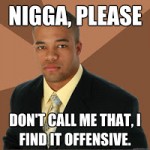 These newly arriving people of African descent preferred the term West Indians and would have been offended if called Black, preferring to be called and referring to themselves as Coloured, as mentioned. They would and did, as do some still today, adamantly reject and refuse to be associated with the term or anything African. [/su_tab] [su_tab title=”UP-LIFT”]
These newly arriving people of African descent preferred the term West Indians and would have been offended if called Black, preferring to be called and referring to themselves as Coloured, as mentioned. They would and did, as do some still today, adamantly reject and refuse to be associated with the term or anything African. [/su_tab] [su_tab title=”UP-LIFT”]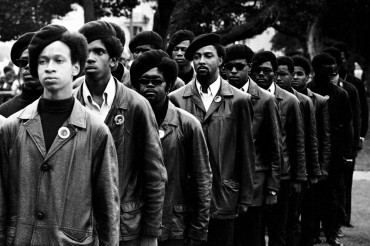 The uplift of African descendants globally:- After the cultural revolution of the 60’s emanating from the U.S, when Black Power, Pride & Beauty was proclaimed, popularised and campaigned, alongside the growing Rasta movement in the Caribbean, Britain and U.S, during the 60’s and 70’s, propagating a Black African Ideology, many moved away from this term Coloured, particularly the younger people, the majority of whom, including those born in Britain, adopted the term Black to describe themselves.
The uplift of African descendants globally:- After the cultural revolution of the 60’s emanating from the U.S, when Black Power, Pride & Beauty was proclaimed, popularised and campaigned, alongside the growing Rasta movement in the Caribbean, Britain and U.S, during the 60’s and 70’s, propagating a Black African Ideology, many moved away from this term Coloured, particularly the younger people, the majority of whom, including those born in Britain, adopted the term Black to describe themselves. 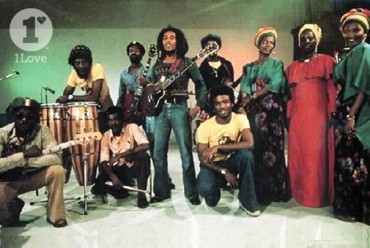 This was a first step forward, additionally a greater step was also taken at this time, by this up and coming generation of Black people in the U.S, the Caribbean & Britain. Including those that formally self-classified themselves as West Indian or Coloured people, who also began to refer to themselves as Afro-Caribbean, and in the U.S Afro or Black Americans. In the U.K this tradition and terminology e.g. Afro-Caribbean , was adopted and is still in use today, but is now quickly dwindling.[/su_tab] [su_tab title=”DIGRESS”]
This was a first step forward, additionally a greater step was also taken at this time, by this up and coming generation of Black people in the U.S, the Caribbean & Britain. Including those that formally self-classified themselves as West Indian or Coloured people, who also began to refer to themselves as Afro-Caribbean, and in the U.S Afro or Black Americans. In the U.K this tradition and terminology e.g. Afro-Caribbean , was adopted and is still in use today, but is now quickly dwindling.[/su_tab] [su_tab title=”DIGRESS”]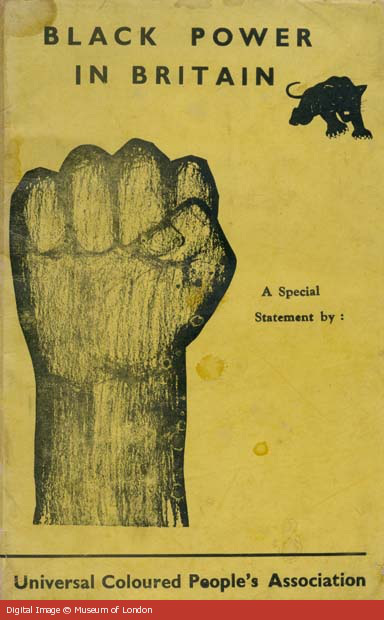 The Root of the problem:-
The Root of the problem:-
So what has happened? Are we still going forward or have we in Britain done a U-Turn and are now going backwards? Let us examine what could and should have happened; Afro should have progressed to African as was and is the very case in the Caribbean and in the U.S.
Take for example the progress of the terminology in the Caribbean itself for instance, from West Indians, to Coloured, to Afro-Caribbean’s and now African-Caribbean’s, or in the U.S, from Colored, to Negro, to Black, then from Black American’s to Afro-American’s to the current day African American. 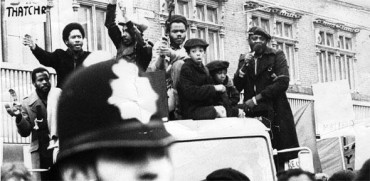 So why wasn’t it a natural progression for the Afro-Caribbean in Britain to have holistically adopted the African – Caribbean term, notwithstanding that some people have done so and continue to do so today, nevertheless these people are definitely the minority. More importantly however is the fact that even if it was the case, that Afro-Caribbean’s in Britain, did progress to African Caribbean’s, would this terminology be sufficient to classify the ethnicity of all people of African descent from the Caribbean in Britain today. Scientifically to some degree yes, but what is absent and most crucial here is a relation or reference to Britain, Britishness and the British experience. That obviously is of great importance, to the younger people of African descent in Britain, as this Britishness is now supplanting their Caribbeaness, in their cultural identity, hense Black British.
So why wasn’t it a natural progression for the Afro-Caribbean in Britain to have holistically adopted the African – Caribbean term, notwithstanding that some people have done so and continue to do so today, nevertheless these people are definitely the minority. More importantly however is the fact that even if it was the case, that Afro-Caribbean’s in Britain, did progress to African Caribbean’s, would this terminology be sufficient to classify the ethnicity of all people of African descent from the Caribbean in Britain today. Scientifically to some degree yes, but what is absent and most crucial here is a relation or reference to Britain, Britishness and the British experience. That obviously is of great importance, to the younger people of African descent in Britain, as this Britishness is now supplanting their Caribbeaness, in their cultural identity, hense Black British.
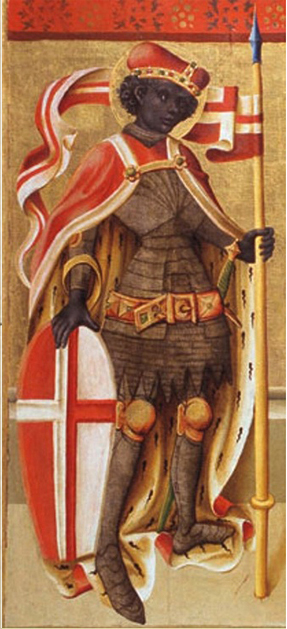 This is very important to note, based upon the rules of ethnic classification which I have already outlined. Where as a persons Ethnicity can correspond and can include their nationality when self-classifying on forms. It is evident that current people of African descent being born, brought up and living in Britain, like others are including their nationality, but are aspiring and classifying themselves as British, not Caribbean or Jamaican, as many have not now any affiliation to these Islands other than a parental connection. However although this national identification is an acceptable ethnic classicification, the term proceeding it i.e. Black is not. But serves to illustrate that a great proportion of people in Britain of African descent, do not have, see or relate themselves to either a African or Caribbean culture or identity. Therefore clearly demonstrates a major crisis, as to a degree, this undoes the progress made in regards to identity, by Black African people over the past decades, even the last century. [/su_tab][/su_tabs][/su_spoiler]
This is very important to note, based upon the rules of ethnic classification which I have already outlined. Where as a persons Ethnicity can correspond and can include their nationality when self-classifying on forms. It is evident that current people of African descent being born, brought up and living in Britain, like others are including their nationality, but are aspiring and classifying themselves as British, not Caribbean or Jamaican, as many have not now any affiliation to these Islands other than a parental connection. However although this national identification is an acceptable ethnic classicification, the term proceeding it i.e. Black is not. But serves to illustrate that a great proportion of people in Britain of African descent, do not have, see or relate themselves to either a African or Caribbean culture or identity. Therefore clearly demonstrates a major crisis, as to a degree, this undoes the progress made in regards to identity, by Black African people over the past decades, even the last century. [/su_tab][/su_tabs][/su_spoiler]
[su_spoiler title=”EXAMINE THE FACTS” style=”fancy” icon=”plus-square-1″][su_tabs][su_tab title=”TABS”]Click on the TABS to the right to Examine the case for the need for an authentic African British-? Identity[/su_tab] [su_tab title=”INTRO”]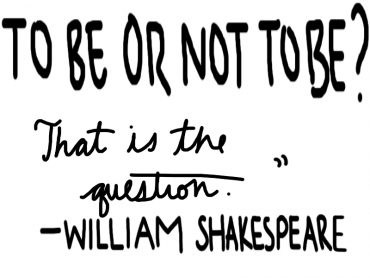 The Ultimate Question:- Should people of African descent born or nationals of Britain, be classified as African British. Similar to how Black people of African descent born in the Caribbean, America and elsewhere are called African Caribbean, African American, Afro-Asian, Afro-Latino and so on. The question is now being asked, posed and proposed; Should people of African descent born in Britain be classified similarly as African British?
The Ultimate Question:- Should people of African descent born or nationals of Britain, be classified as African British. Similar to how Black people of African descent born in the Caribbean, America and elsewhere are called African Caribbean, African American, Afro-Asian, Afro-Latino and so on. The question is now being asked, posed and proposed; Should people of African descent born in Britain be classified similarly as African British?
Before we answer this question let us first present and analyse some of the available facts that will help us better understand what is really being asked.[/su_tab] [su_tab title=”THE U.S. “]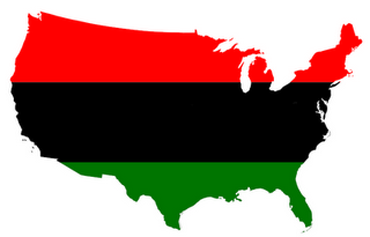 What is an African American?:- First let us see what makes and African American? Any person of African descent born in America is an African American. This does not only apply to people of African descent with a direct ancestry and heritage in America. Therefore people who’s parents or themselves were born in the Caribbean, Africa or elsewhere, when naturalised as U.S citizens are immediately classified and presented as African American’s, examples of this are; Notorious Big, Cool Herc, Louis Farrakhan, Collin Powell and a host of other famous so-called African Americans.
What is an African American?:- First let us see what makes and African American? Any person of African descent born in America is an African American. This does not only apply to people of African descent with a direct ancestry and heritage in America. Therefore people who’s parents or themselves were born in the Caribbean, Africa or elsewhere, when naturalised as U.S citizens are immediately classified and presented as African American’s, examples of this are; Notorious Big, Cool Herc, Louis Farrakhan, Collin Powell and a host of other famous so-called African Americans. 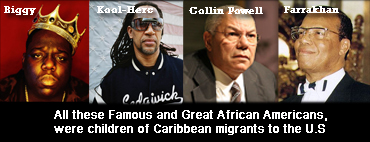 Obviously the most famous and influential of these is the current U.S President Barrack Obama, who’s is of mixed origin, none of these emanating directly from the actual defined African American experience. However for these African descendants and thousands possibly millions of others born in the U.S their African American status and identity is never at question or taken as written.
Obviously the most famous and influential of these is the current U.S President Barrack Obama, who’s is of mixed origin, none of these emanating directly from the actual defined African American experience. However for these African descendants and thousands possibly millions of others born in the U.S their African American status and identity is never at question or taken as written.
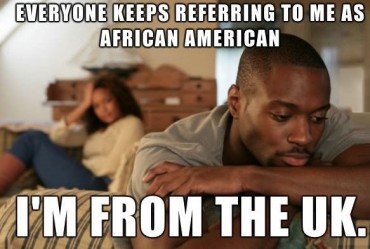 This rational is also applied in the Caribbean although fewer examples could be given, but the rational still remains the same.
This rational is also applied in the Caribbean although fewer examples could be given, but the rational still remains the same.
In fact consider this; if an African American migrates to the Caribbean, which many have done and are still doing, how long would they maintain and retain their African American identity and status? Would they or their offspring ever become African Caribbean? Although the African American identity is very much respected and has an influential global force, no doubt after a few generations and maybe only decades they would be absorbed into the African Caribbean cultural and traditions and therefore forfeit their African Americaness.[/su_tab] [su_tab title=”CONCERN”]What is the main Concern?:- The main concern or contention is that if an African American, African Caribbean or even a Native African comes to Britain they will maintain their status which is supposedly passed on to their offspring indefinitely. This has not been the case though as many of their offspring, as already mentioned above, have now become the new Black British or Black Caribbean’s. Therefore in reality what has happened is coming to Britain has actually meant abandoning their Africaness entirely, not only for the descendants of Africans from the Caribbean and elsewhere, but even for the native African’s themselves from the continent.
Therefore in reality what has happened is coming to Britain has actually meant abandoning their Africaness entirely, not only for the descendants of Africans from the Caribbean and elsewhere, but even for the native African’s themselves from the continent.
This should raise much concern about what is happening to people of African descent in Britain, as well as why does coming to, being born or being nationalised in Britain, have a different outcome and require a different formula for classifying their identity, than being born with the identical heritage elsewhere in the world.
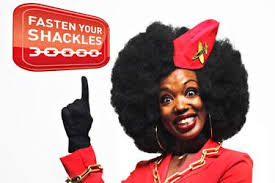 At best we retain our African identity when we continue to define and classify ourselves as Afro or African Caribbean in Britain, the terminology inherited by the 1st generation of Caribbean migrants and some 2nd generation, but is mostly disused by most 2nd generation and the vast majority of 3rd generation Caribbean migrants born in Britain.
At best we retain our African identity when we continue to define and classify ourselves as Afro or African Caribbean in Britain, the terminology inherited by the 1st generation of Caribbean migrants and some 2nd generation, but is mostly disused by most 2nd generation and the vast majority of 3rd generation Caribbean migrants born in Britain.
Although 1st, 2nd & 3rd generation descendents of Caribbean people in Britain can still authentically use African or even Afro-Caribbean to classify themselves, as mention already, many have declined to do so, for what ever reason. But even if all did chose to use this terminology would it truly represents the people it describes? Let us see.[/su_tab] [su_tab title=”CARIBBEAN”]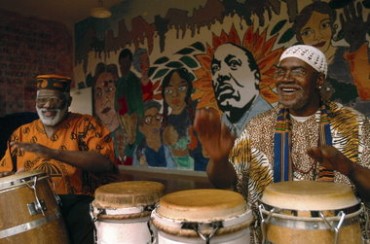 What is an African Caribbean?:- As this term illustrates, an African Caribbean is a person born or with family connection in Caribbean, who are of African descent. This term is accepted universally for people of African descent all over the Caribbean. However a person not of African ancestry from the Caribbean is referred to as just Caribbean. It should also be noted here that Caribbean as an ethnic or ancestral type can only in actuality be applied to the natives of those Islands e.g. the Arawaks and the Caribs from whom the term originates.
What is an African Caribbean?:- As this term illustrates, an African Caribbean is a person born or with family connection in Caribbean, who are of African descent. This term is accepted universally for people of African descent all over the Caribbean. However a person not of African ancestry from the Caribbean is referred to as just Caribbean. It should also be noted here that Caribbean as an ethnic or ancestral type can only in actuality be applied to the natives of those Islands e.g. the Arawaks and the Caribs from whom the term originates. 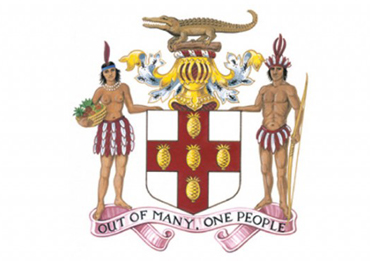 Furthermore the majority of African Caribbean people claim or recognise no direct or even indirect descent from these Indigenous Native Islanders. Therefore this term when used and applied by people of African descent is mostly a cultural and not a racial classification. Additionally the actual ethnicity of the Native Caribbean’s is Indian, which would in Britain, be classified as Asian, despite the fact that the Caribbean is not on the Asian Continent. These facts are evident in the terminology that proceeded the term Caribbean, e.g. West Indian that was applied to and accepted by people of evident African descent with little if any recognised Indian, Asian or Caribbean ethnic ties.
Furthermore the majority of African Caribbean people claim or recognise no direct or even indirect descent from these Indigenous Native Islanders. Therefore this term when used and applied by people of African descent is mostly a cultural and not a racial classification. Additionally the actual ethnicity of the Native Caribbean’s is Indian, which would in Britain, be classified as Asian, despite the fact that the Caribbean is not on the Asian Continent. These facts are evident in the terminology that proceeded the term Caribbean, e.g. West Indian that was applied to and accepted by people of evident African descent with little if any recognised Indian, Asian or Caribbean ethnic ties.
Therefore when applied to Racial, Caribbean’s are Indians, so if a person does not have a direct Arawak/Carib and African ancestry then they can not rightly be classified as African Caribbean. However this term can still suffice as a cultural heritage and identity classification, which is also of great importance to ethnicity.
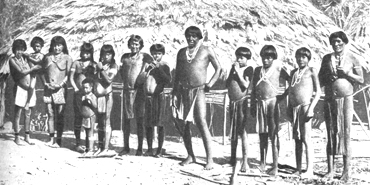 When we therefore take a closer look we can see that both African Caribbean’s & American’s (Native Americans are also called Indians) use these terms whether knowingly or not as purely nationalistic and cultural classifications , with no relation to racial or ancestral connections.
When we therefore take a closer look we can see that both African Caribbean’s & American’s (Native Americans are also called Indians) use these terms whether knowingly or not as purely nationalistic and cultural classifications , with no relation to racial or ancestral connections.
Baring this in mind it is clear then that it is the African inclusion in these terms that is important and enforces the ethnic identity that has been and remains so influential in maintaining a positive cultural identity. It cannot be stressed enough that Caribbean and American has nothing to do with race or ethnicity and can be and is often interchangeable dependent upon where you or your parents were born as we have seen.[/su_tab] [su_tab title=”BRITAIN”] The Crisis in Britain:- After analysing the above facts and baring in mind the impact and influence cultural identity has on a persons self-esteem and self-worth, it is very important that what is happening in Britain to African descendents is not overlooked or left unchallenged. Furthermore it is of paramount importance that a practical and strategic programmed be inaugurated to ensure these people and their generations are not bereaved of this most valuable of human attributes and characteristic. Their Ethnicity and a Authentic Cultural Identity. This can be achieved by strategically and authentically attributing to them the term African British.
The Crisis in Britain:- After analysing the above facts and baring in mind the impact and influence cultural identity has on a persons self-esteem and self-worth, it is very important that what is happening in Britain to African descendents is not overlooked or left unchallenged. Furthermore it is of paramount importance that a practical and strategic programmed be inaugurated to ensure these people and their generations are not bereaved of this most valuable of human attributes and characteristic. Their Ethnicity and a Authentic Cultural Identity. This can be achieved by strategically and authentically attributing to them the term African British.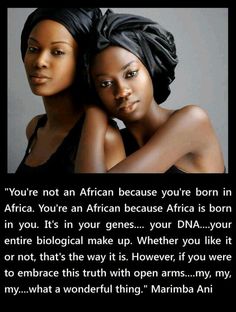 [/su_tab] [su_tab title=”RESPECT”]
[/su_tab] [su_tab title=”RESPECT”]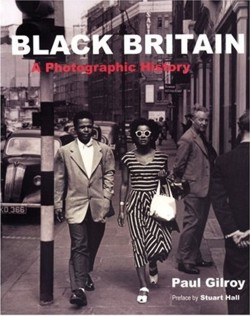 The Term Black British:- Although as mention the term Black British seems to be the preference and preferred terminology of the majority of people of African descent in Britain today to describe themselves. It should be remembered that many not only reject this classification, but also maintain an Afro or African Caribbean identity. Therefore it is evident that this term Black British although mainstream and accepted by the masses, both African & non-Africans, is not a suitable classification, for all people usually grouped within this category. Nevertheless as mention, those who do not ascribe to this Black British term, can by law and with all authority self-classify themselves, meaning, put Afro-African-Caribbean on forms to identify their identity. Also as people are given the opportunity by law to self-classify, it should also be remembered that those who do ascribe to be Black British are free to do so also.
The Term Black British:- Although as mention the term Black British seems to be the preference and preferred terminology of the majority of people of African descent in Britain today to describe themselves. It should be remembered that many not only reject this classification, but also maintain an Afro or African Caribbean identity. Therefore it is evident that this term Black British although mainstream and accepted by the masses, both African & non-Africans, is not a suitable classification, for all people usually grouped within this category. Nevertheless as mention, those who do not ascribe to this Black British term, can by law and with all authority self-classify themselves, meaning, put Afro-African-Caribbean on forms to identify their identity. Also as people are given the opportunity by law to self-classify, it should also be remembered that those who do ascribe to be Black British are free to do so also. 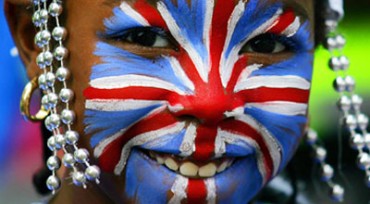 This is all well and good, however a major problem and concern exists with this new term, particularly when this term is being applied to people of African descent who have resided in Britain before this terminology arose over the last two decades. Namely those from the Caribbean & Africa who, committed and in many cases lost their lives, trying to maintain, uphold and propagate the importance of loving, respecting and been proud of an African identity. In fact this is one of the greatest DISRESPECTS that could be paid to these, great icons, revolutionaries and prized sons and daughters of Africa. That today even they have been stripped of their African identity and are being classified alongside modern people of African Descent in Britain as Black British.
This is all well and good, however a major problem and concern exists with this new term, particularly when this term is being applied to people of African descent who have resided in Britain before this terminology arose over the last two decades. Namely those from the Caribbean & Africa who, committed and in many cases lost their lives, trying to maintain, uphold and propagate the importance of loving, respecting and been proud of an African identity. In fact this is one of the greatest DISRESPECTS that could be paid to these, great icons, revolutionaries and prized sons and daughters of Africa. That today even they have been stripped of their African identity and are being classified alongside modern people of African Descent in Britain as Black British. 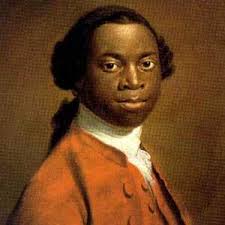 Great Africans such a Equiano, Ottobah, Mary Seacole, Mary Prince and others, have been demoted although still honoured as Black British, these individuals not to mentions the millions of Africans who have live on this specific Island, today called Britain, from time immemorial. This is totally not acceptable, on any level whats so ever.
Great Africans such a Equiano, Ottobah, Mary Seacole, Mary Prince and others, have been demoted although still honoured as Black British, these individuals not to mentions the millions of Africans who have live on this specific Island, today called Britain, from time immemorial. This is totally not acceptable, on any level whats so ever.
Let the whole world therefore be assured, that neither of the people mentioned here or any other person who has had any affinity or direct connection to Africa, worse still if they advocated it vocally whilst alive, would accept this term Black British. Therefore Imani on there behalf, will ensure that their deserved status as great African people and members of the African Diaspora, be preserved, maintained and respected by all, as well as challenge anyone, individual, group, nation and even the whole world if necessary, whoever try’s to deny them this earned not to mention God given right to be African, and try’s to classify them as simply Black British. 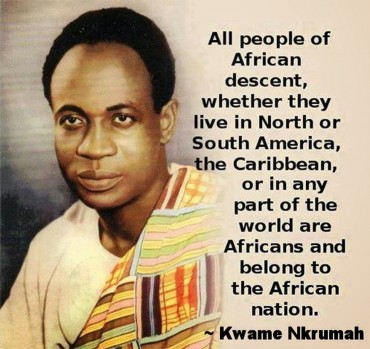 [/su_tab] [su_tab title=”CONCLUSION”]
[/su_tab] [su_tab title=”CONCLUSION”] The African British:- Now we have analysed what makes an African American & African Caribbean and in what context these terms are used, now we can understand why it is imperative why and how this methodology can and should be likewise applied to people of African descent born or who have migrated to Britain.[/su_tab][/su_tabs][/su_spoiler]
The African British:- Now we have analysed what makes an African American & African Caribbean and in what context these terms are used, now we can understand why it is imperative why and how this methodology can and should be likewise applied to people of African descent born or who have migrated to Britain.[/su_tab][/su_tabs][/su_spoiler]
[su_spoiler title=”GET INVOLVE / SPONSOR / DONATE” style=”fancy” icon=”plus-square-1″] If you would like to know more about the African British Connection, or whether you are interested in getting involved, sponsoring, donating or supporting this initiative in anyway, please contact Imani and the team, through our contact page. Alternative you can donate directly without any communication by clicking the website donations icons. We look forward to hearing from you and hope that this page and website generally has be of some assistance to you.
If you would like to know more about the African British Connection, or whether you are interested in getting involved, sponsoring, donating or supporting this initiative in anyway, please contact Imani and the team, through our contact page. Alternative you can donate directly without any communication by clicking the website donations icons. We look forward to hearing from you and hope that this page and website generally has be of some assistance to you.
We Thank you in anticipation of your Support,[/su_spoiler]
Adinkra Symbol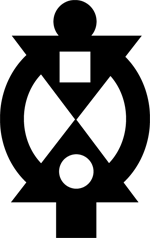 Name: Boa Me Na Me Mmoa Wo
Name: Boa Me Na Me Mmoa Wo
Meaning: Help Me and Let Me Help You
Symbolising: Cooperation and Independence
Permanent link to this article: https://imaniswebsite.co.uk/african-british-connection/
 Click on the TABS to the right to get an overview of the African British Connection Campaign. [/su_tab] [su_tab title=”WHAT”]
Click on the TABS to the right to get an overview of the African British Connection Campaign. [/su_tab] [su_tab title=”WHAT”] WHAT?:- The African British Connection Campaign is a project that seeks to propagate for the use of the term African British or African British- ? (Caribbean, Nigerian, Mixed etc.) as an ethnic code to be used by people of African descent who were born or who are British citizen. .[/su_tab] [su_tab title=”WHO”]
WHAT?:- The African British Connection Campaign is a project that seeks to propagate for the use of the term African British or African British- ? (Caribbean, Nigerian, Mixed etc.) as an ethnic code to be used by people of African descent who were born or who are British citizen. .[/su_tab] [su_tab title=”WHO”] WHO?:- All people of direct African descent born in Britain or living in Britain with British Citizenship, currently referred to as Black British, Afro-Caribbean, Caribbean, African Caribbean, African, Mixed Caribbean or Africans with Ethnic Europeans.[/su_tab] [su_tab title=”AIM”]
WHO?:- All people of direct African descent born in Britain or living in Britain with British Citizenship, currently referred to as Black British, Afro-Caribbean, Caribbean, African Caribbean, African, Mixed Caribbean or Africans with Ethnic Europeans.[/su_tab] [su_tab title=”AIM”] AIMS:- To campaign within and amongst the African-Caribbean, Black British, British African, Caribbean and Mixed/Dual Heritage communities and people throughout the United Kingdom, to adopt African British/Caribbean as a universal Ethnic category description when self-classifying on forms or when participating in surveys or other statistical collecting exercises.[/su_tab] [su_tab title=”OBJECT”]
AIMS:- To campaign within and amongst the African-Caribbean, Black British, British African, Caribbean and Mixed/Dual Heritage communities and people throughout the United Kingdom, to adopt African British/Caribbean as a universal Ethnic category description when self-classifying on forms or when participating in surveys or other statistical collecting exercises.[/su_tab] [su_tab title=”OBJECT”] OBJECTIVE:- To ensure that current and all future people of direct African descent born or residing as a citizen within the United Kingdom share in a positive identity that reflects, reinforces and strengthens their connection to African, British & Caribbean cultural heritage. This is hoped to establish a platform and create the vehicle upon which a cohesive cultural identity can be firmly established that truly reflects this unique heritage, its cultural aspirations and expressions that currently exists, here in Britain today.[/su_tab] [su_tab title=”WHEN”]
OBJECTIVE:- To ensure that current and all future people of direct African descent born or residing as a citizen within the United Kingdom share in a positive identity that reflects, reinforces and strengthens their connection to African, British & Caribbean cultural heritage. This is hoped to establish a platform and create the vehicle upon which a cohesive cultural identity can be firmly established that truly reflects this unique heritage, its cultural aspirations and expressions that currently exists, here in Britain today.[/su_tab] [su_tab title=”WHEN”] WHEN IT STARTED?:- Although Imani has over many years been campaigning for the use of the term African British as a self-classification for African people in Britain, this has mostly been on a local and personal level, i.e. friends and family, personally he has used this term in self-classifying himself on forms over the past 15 years . Officially however as part of Imani’s public Activism, this term through this campaign was actually Launched on August 1st 2014, to mark and commemorate exactly 100 years, from the founding of the U.N.I.A (Universal Negro Improvement Association), in 1914 by the Rt. Hon. Marcus M. Garvey.[/su_tab] [su_tab title=”WHERE”]
WHEN IT STARTED?:- Although Imani has over many years been campaigning for the use of the term African British as a self-classification for African people in Britain, this has mostly been on a local and personal level, i.e. friends and family, personally he has used this term in self-classifying himself on forms over the past 15 years . Officially however as part of Imani’s public Activism, this term through this campaign was actually Launched on August 1st 2014, to mark and commemorate exactly 100 years, from the founding of the U.N.I.A (Universal Negro Improvement Association), in 1914 by the Rt. Hon. Marcus M. Garvey.[/su_tab] [su_tab title=”WHERE”] WHERE?:- Imani’s intention and campaigning strategy will be implemented and propagated throughout Britain, beginning in Birmingham, Sandwell & The Black Country, although simultaneously targeting African – Caribbean – Mixed, people and their respective communities throughout the United Kingdom.[/su_tab] [su_tab title=”HOW”]
WHERE?:- Imani’s intention and campaigning strategy will be implemented and propagated throughout Britain, beginning in Birmingham, Sandwell & The Black Country, although simultaneously targeting African – Caribbean – Mixed, people and their respective communities throughout the United Kingdom.[/su_tab] [su_tab title=”HOW”] HOW?:- The ABC Campaign will be implemented through a series of vehicles that include, educational resources such as; Exhibitions, displays and other education products; Focused community projects and events, including street canvassing throughout the United Kingdom; Through different media mediums, i.e. radio, video’s, music social, news, e.t.c. Imani will try to engage all the available resources, utilise all avenues to his fullest capacity to ensure that this campaign, achieves maximum exposure and support throughout Britain and across the globe. [/su_tab][/su_tabs][/su_spoiler]
HOW?:- The ABC Campaign will be implemented through a series of vehicles that include, educational resources such as; Exhibitions, displays and other education products; Focused community projects and events, including street canvassing throughout the United Kingdom; Through different media mediums, i.e. radio, video’s, music social, news, e.t.c. Imani will try to engage all the available resources, utilise all avenues to his fullest capacity to ensure that this campaign, achieves maximum exposure and support throughout Britain and across the globe. [/su_tab][/su_tabs][/su_spoiler] Click on the TABS to the right to to Learn More About the African British Connection Campaign & Programme[/su_tab] [su_tab title=”INTRO”]
Click on the TABS to the right to to Learn More About the African British Connection Campaign & Programme[/su_tab] [su_tab title=”INTRO”] People of African descent born in Britain, particularly the young and those who’s parents or parent recently came from the Caribbean, have for more than a generation struggled with their cultural and ethnic identity. This is no more evident and demonstrated than when they are filling in forms that require an ethnic code. Even though many do maintain the terminology used to identify their parents and grandparents, i.e.
People of African descent born in Britain, particularly the young and those who’s parents or parent recently came from the Caribbean, have for more than a generation struggled with their cultural and ethnic identity. This is no more evident and demonstrated than when they are filling in forms that require an ethnic code. Even though many do maintain the terminology used to identify their parents and grandparents, i.e.  Afro-Caribbean, or African Caribbean, some first generation and the vast majority of the now second & third generation born in Britain, no longer ascribe to this classification or terminology and currently use the terms Black British, Caribbean British, Black Caribbean and sometimes simply British. Many also leave this question blank entirely. This makes it difficult to gather easily statistical information in relation to this subject group, in order to better identify gaps, inequalities or better implement targeted strategies to address some of their specific issues. According to the Office for National Statistics, at the 2001 census there were over a million black people in the United Kingdom; 1% of the total population described themselves as “Black Caribbean”, 0.8% as “Black African”, and 0.2% as “Black other”[/su_tab] [su_tab title=”NEED”]
Afro-Caribbean, or African Caribbean, some first generation and the vast majority of the now second & third generation born in Britain, no longer ascribe to this classification or terminology and currently use the terms Black British, Caribbean British, Black Caribbean and sometimes simply British. Many also leave this question blank entirely. This makes it difficult to gather easily statistical information in relation to this subject group, in order to better identify gaps, inequalities or better implement targeted strategies to address some of their specific issues. According to the Office for National Statistics, at the 2001 census there were over a million black people in the United Kingdom; 1% of the total population described themselves as “Black Caribbean”, 0.8% as “Black African”, and 0.2% as “Black other”[/su_tab] [su_tab title=”NEED”] The need for change:- Although Black British seems to be the terminology generally accepted by the majority of British born people of African descent and is used and accepted as a self-classification code for national U.K statistical purposes. This accepted term nevertheless has no actual basis in ethnicity and further aims to contribute to this cultural identity crisis if persisted unchallenged. Legally speaking, the term Black British can rightly be applied to people of African descent, but likewise could also be equally applied in reference to a person of Asian background, or any person of a none-white background, excepting the Irish who have in the past, although being ethnically European’s themselves, have also been categorised under the term black.
The need for change:- Although Black British seems to be the terminology generally accepted by the majority of British born people of African descent and is used and accepted as a self-classification code for national U.K statistical purposes. This accepted term nevertheless has no actual basis in ethnicity and further aims to contribute to this cultural identity crisis if persisted unchallenged. Legally speaking, the term Black British can rightly be applied to people of African descent, but likewise could also be equally applied in reference to a person of Asian background, or any person of a none-white background, excepting the Irish who have in the past, although being ethnically European’s themselves, have also been categorised under the term black. What is ethnicity?:- An ethnicity, or ethnic group, is a socially-defined category of people who identify with each other based on common ancestral, social, cultural, or national experience, (wiki definition).
What is ethnicity?:- An ethnicity, or ethnic group, is a socially-defined category of people who identify with each other based on common ancestral, social, cultural, or national experience, (wiki definition). Therefore in identifying a person’s ethnicity in regards to Racial or ancestral origins, one has only a handful of categories to select from, none of which include nationality, but rather the continent from which a nation is located e.g. Africa, Europe, America’s, Asia and so on. This being the case, things could be possibly simpler if nationality ethnic origin i.e. racial, cultural and religious questions were asked separately as was the case in the past. Nevertheless this would require people to spend a lot more time filling in a form, something most people would not welcome. It is based upon this understanding of Ethnicity that one can see that the term Black, now been used by people of Caribbean and African descent in Britain, has no relevance or authenticity in regards to Ethnicity or Ethnic origins. Also this also indicates that what is known as Ethnogenesis, the development of a new Ethnic group, is currently emerging within the African – Black communities in Britain. Therefore let us examine how this term Black, has developed within this particular community, to be now used and applied or engaged as a self-classification of ethnicity by its users. [/su_tab] [su_tab title=”BLACK”]
Therefore in identifying a person’s ethnicity in regards to Racial or ancestral origins, one has only a handful of categories to select from, none of which include nationality, but rather the continent from which a nation is located e.g. Africa, Europe, America’s, Asia and so on. This being the case, things could be possibly simpler if nationality ethnic origin i.e. racial, cultural and religious questions were asked separately as was the case in the past. Nevertheless this would require people to spend a lot more time filling in a form, something most people would not welcome. It is based upon this understanding of Ethnicity that one can see that the term Black, now been used by people of Caribbean and African descent in Britain, has no relevance or authenticity in regards to Ethnicity or Ethnic origins. Also this also indicates that what is known as Ethnogenesis, the development of a new Ethnic group, is currently emerging within the African – Black communities in Britain. Therefore let us examine how this term Black, has developed within this particular community, to be now used and applied or engaged as a self-classification of ethnicity by its users. [/su_tab] [su_tab title=”BLACK”] The Term Black:- As things stands, with no separation on forms to identify and differentiate between a persons ethnicity; i.e. culture, religion and nationality and since it is left therefore for people to themselves self classify, without any persuasion or encouragement from the state and government. It is therefore of paramount importance that this terminology Black, in regards to ethnicity of people of African descent be discouraged and totally disbanded, by African’s in Britain as a ethnic classification, as it is not valid neither conducive to a positive identity, other than in reference to skin colour and not literally speaking either, but in the positive identity, given to this term, during the Black Power Movements of the 1960’s and 1970’s.
The Term Black:- As things stands, with no separation on forms to identify and differentiate between a persons ethnicity; i.e. culture, religion and nationality and since it is left therefore for people to themselves self classify, without any persuasion or encouragement from the state and government. It is therefore of paramount importance that this terminology Black, in regards to ethnicity of people of African descent be discouraged and totally disbanded, by African’s in Britain as a ethnic classification, as it is not valid neither conducive to a positive identity, other than in reference to skin colour and not literally speaking either, but in the positive identity, given to this term, during the Black Power Movements of the 1960’s and 1970’s.  However rather than maintaining its positive influence on people of African descent, the term when applied to ethnicity, is in fact and may already be and will no doubt eventually, have an adverse and negative affect that further separate’s and further alienates the individual using it, from their true identity, ethnic & ancestral origins which is undoubtedly and without question African.
However rather than maintaining its positive influence on people of African descent, the term when applied to ethnicity, is in fact and may already be and will no doubt eventually, have an adverse and negative affect that further separate’s and further alienates the individual using it, from their true identity, ethnic & ancestral origins which is undoubtedly and without question African. terms, Negro’s and Colored. Who were also using the term Black, purely and specifically in relation to describing their skin colour e.g. be proud to be black, black is beautiful and so on, in opposition to have been referred to by the outdated, none-reflective and even perceived racist terms colored and negro. These self acclaimed Black people at the time and those who emanated from this generation and identity, had no confusion or any anxiety about their ethnic origin and unanimously would have self-classified themselves ethnically as African, as many of them did and continue to do so today, as seen in the Caribbean the U.S. and elsewhere.[/su_tab] [su_tab title=”CRISIS”]
terms, Negro’s and Colored. Who were also using the term Black, purely and specifically in relation to describing their skin colour e.g. be proud to be black, black is beautiful and so on, in opposition to have been referred to by the outdated, none-reflective and even perceived racist terms colored and negro. These self acclaimed Black people at the time and those who emanated from this generation and identity, had no confusion or any anxiety about their ethnic origin and unanimously would have self-classified themselves ethnically as African, as many of them did and continue to do so today, as seen in the Caribbean the U.S. and elsewhere.[/su_tab] [su_tab title=”CRISIS”] The Background to the Cultural Identity Crisis:- It is true that many of those people in question today, who use Black as their ethnic group, code or origin would not classify themselves as African, absolutely not, but baring in mind that neither did or would many of their forbears, after leaving the continent of Africa and being born and brought up in the Caribbean, this of course includes their immediate ancestor and their current older family members, who have migrated to Britain over the past 50 years.
The Background to the Cultural Identity Crisis:- It is true that many of those people in question today, who use Black as their ethnic group, code or origin would not classify themselves as African, absolutely not, but baring in mind that neither did or would many of their forbears, after leaving the continent of Africa and being born and brought up in the Caribbean, this of course includes their immediate ancestor and their current older family members, who have migrated to Britain over the past 50 years. These newly arriving people of African descent preferred the term West Indians and would have been offended if called Black, preferring to be called and referring to themselves as Coloured, as mentioned. They would and did, as do some still today, adamantly reject and refuse to be associated with the term or anything African. [/su_tab] [su_tab title=”UP-LIFT”]
These newly arriving people of African descent preferred the term West Indians and would have been offended if called Black, preferring to be called and referring to themselves as Coloured, as mentioned. They would and did, as do some still today, adamantly reject and refuse to be associated with the term or anything African. [/su_tab] [su_tab title=”UP-LIFT”] The uplift of African descendants globally:- After the cultural revolution of the 60’s emanating from the U.S, when Black Power, Pride & Beauty was proclaimed, popularised and campaigned, alongside the growing Rasta movement in the Caribbean, Britain and U.S, during the 60’s and 70’s, propagating a Black African Ideology, many moved away from this term Coloured, particularly the younger people, the majority of whom, including those born in Britain, adopted the term Black to describe themselves.
The uplift of African descendants globally:- After the cultural revolution of the 60’s emanating from the U.S, when Black Power, Pride & Beauty was proclaimed, popularised and campaigned, alongside the growing Rasta movement in the Caribbean, Britain and U.S, during the 60’s and 70’s, propagating a Black African Ideology, many moved away from this term Coloured, particularly the younger people, the majority of whom, including those born in Britain, adopted the term Black to describe themselves.  This was a first step forward, additionally a greater step was also taken at this time, by this up and coming generation of Black people in the U.S, the Caribbean & Britain. Including those that formally self-classified themselves as West Indian or Coloured people, who also began to refer to themselves as Afro-Caribbean, and in the U.S Afro or Black Americans. In the U.K this tradition and terminology e.g. Afro-Caribbean , was adopted and is still in use today, but is now quickly dwindling.[/su_tab] [su_tab title=”DIGRESS”]
This was a first step forward, additionally a greater step was also taken at this time, by this up and coming generation of Black people in the U.S, the Caribbean & Britain. Including those that formally self-classified themselves as West Indian or Coloured people, who also began to refer to themselves as Afro-Caribbean, and in the U.S Afro or Black Americans. In the U.K this tradition and terminology e.g. Afro-Caribbean , was adopted and is still in use today, but is now quickly dwindling.[/su_tab] [su_tab title=”DIGRESS”] The Root of the problem:-
The Root of the problem:- So why wasn’t it a natural progression for the Afro-Caribbean in Britain to have holistically adopted the African – Caribbean term, notwithstanding that some people have done so and continue to do so today, nevertheless these people are definitely the minority. More importantly however is the fact that even if it was the case, that Afro-Caribbean’s in Britain, did progress to African Caribbean’s, would this terminology be sufficient to classify the ethnicity of all people of African descent from the Caribbean in Britain today. Scientifically to some degree yes, but what is absent and most crucial here is a relation or reference to Britain, Britishness and the British experience. That obviously is of great importance, to the younger people of African descent in Britain, as this Britishness is now supplanting their Caribbeaness, in their cultural identity, hense Black British.
So why wasn’t it a natural progression for the Afro-Caribbean in Britain to have holistically adopted the African – Caribbean term, notwithstanding that some people have done so and continue to do so today, nevertheless these people are definitely the minority. More importantly however is the fact that even if it was the case, that Afro-Caribbean’s in Britain, did progress to African Caribbean’s, would this terminology be sufficient to classify the ethnicity of all people of African descent from the Caribbean in Britain today. Scientifically to some degree yes, but what is absent and most crucial here is a relation or reference to Britain, Britishness and the British experience. That obviously is of great importance, to the younger people of African descent in Britain, as this Britishness is now supplanting their Caribbeaness, in their cultural identity, hense Black British. This is very important to note, based upon the rules of ethnic classification which I have already outlined. Where as a persons Ethnicity can correspond and can include their nationality when self-classifying on forms. It is evident that current people of African descent being born, brought up and living in Britain, like others are including their nationality, but are aspiring and classifying themselves as British, not Caribbean or Jamaican, as many have not now any affiliation to these Islands other than a parental connection. However although this national identification is an acceptable ethnic classicification, the term proceeding it i.e. Black is not. But serves to illustrate that a great proportion of people in Britain of African descent, do not have, see or relate themselves to either a African or Caribbean culture or identity. Therefore clearly demonstrates a major crisis, as to a degree, this undoes the progress made in regards to identity, by Black African people over the past decades, even the last century. [/su_tab][/su_tabs][/su_spoiler]
This is very important to note, based upon the rules of ethnic classification which I have already outlined. Where as a persons Ethnicity can correspond and can include their nationality when self-classifying on forms. It is evident that current people of African descent being born, brought up and living in Britain, like others are including their nationality, but are aspiring and classifying themselves as British, not Caribbean or Jamaican, as many have not now any affiliation to these Islands other than a parental connection. However although this national identification is an acceptable ethnic classicification, the term proceeding it i.e. Black is not. But serves to illustrate that a great proportion of people in Britain of African descent, do not have, see or relate themselves to either a African or Caribbean culture or identity. Therefore clearly demonstrates a major crisis, as to a degree, this undoes the progress made in regards to identity, by Black African people over the past decades, even the last century. [/su_tab][/su_tabs][/su_spoiler] The Ultimate Question:- Should people of African descent born or nationals of Britain, be classified as African British. Similar to how Black people of African descent born in the Caribbean, America and elsewhere are called African Caribbean, African American, Afro-Asian, Afro-Latino and so on. The question is now being asked, posed and proposed; Should people of African descent born in Britain be classified similarly as African British?
The Ultimate Question:- Should people of African descent born or nationals of Britain, be classified as African British. Similar to how Black people of African descent born in the Caribbean, America and elsewhere are called African Caribbean, African American, Afro-Asian, Afro-Latino and so on. The question is now being asked, posed and proposed; Should people of African descent born in Britain be classified similarly as African British? What is an African American?:- First let us see what makes and African American? Any person of African descent born in America is an African American. This does not only apply to people of African descent with a direct ancestry and heritage in America. Therefore people who’s parents or themselves were born in the Caribbean, Africa or elsewhere, when naturalised as U.S citizens are immediately classified and presented as African American’s, examples of this are; Notorious Big, Cool Herc, Louis Farrakhan, Collin Powell and a host of other famous so-called African Americans.
What is an African American?:- First let us see what makes and African American? Any person of African descent born in America is an African American. This does not only apply to people of African descent with a direct ancestry and heritage in America. Therefore people who’s parents or themselves were born in the Caribbean, Africa or elsewhere, when naturalised as U.S citizens are immediately classified and presented as African American’s, examples of this are; Notorious Big, Cool Herc, Louis Farrakhan, Collin Powell and a host of other famous so-called African Americans.  Obviously the most famous and influential of these is the current U.S President Barrack Obama, who’s is of mixed origin, none of these emanating directly from the actual defined African American experience. However for these African descendants and thousands possibly millions of others born in the U.S their African American status and identity is never at question or taken as written.
Obviously the most famous and influential of these is the current U.S President Barrack Obama, who’s is of mixed origin, none of these emanating directly from the actual defined African American experience. However for these African descendants and thousands possibly millions of others born in the U.S their African American status and identity is never at question or taken as written. This rational is also applied in the Caribbean although fewer examples could be given, but the rational still remains the same.
This rational is also applied in the Caribbean although fewer examples could be given, but the rational still remains the same. Therefore in reality what has happened is coming to Britain has actually meant abandoning their Africaness entirely, not only for the descendants of Africans from the Caribbean and elsewhere, but even for the native African’s themselves from the continent.
Therefore in reality what has happened is coming to Britain has actually meant abandoning their Africaness entirely, not only for the descendants of Africans from the Caribbean and elsewhere, but even for the native African’s themselves from the continent. At best we retain our African identity when we continue to define and classify ourselves as Afro or African Caribbean in Britain, the terminology inherited by the 1st generation of Caribbean migrants and some 2nd generation, but is mostly disused by most 2nd generation and the vast majority of 3rd generation Caribbean migrants born in Britain.
At best we retain our African identity when we continue to define and classify ourselves as Afro or African Caribbean in Britain, the terminology inherited by the 1st generation of Caribbean migrants and some 2nd generation, but is mostly disused by most 2nd generation and the vast majority of 3rd generation Caribbean migrants born in Britain. What is an African Caribbean?:- As this term illustrates, an African Caribbean is a person born or with family connection in Caribbean, who are of African descent. This term is accepted universally for people of African descent all over the Caribbean. However a person not of African ancestry from the Caribbean is referred to as just Caribbean. It should also be noted here that Caribbean as an ethnic or ancestral type can only in actuality be applied to the natives of those Islands e.g. the Arawaks and the Caribs from whom the term originates.
What is an African Caribbean?:- As this term illustrates, an African Caribbean is a person born or with family connection in Caribbean, who are of African descent. This term is accepted universally for people of African descent all over the Caribbean. However a person not of African ancestry from the Caribbean is referred to as just Caribbean. It should also be noted here that Caribbean as an ethnic or ancestral type can only in actuality be applied to the natives of those Islands e.g. the Arawaks and the Caribs from whom the term originates.  Furthermore the majority of African Caribbean people claim or recognise no direct or even indirect descent from these Indigenous Native Islanders. Therefore this term when used and applied by people of African descent is mostly a cultural and not a racial classification. Additionally the actual ethnicity of the Native Caribbean’s is Indian, which would in Britain, be classified as Asian, despite the fact that the Caribbean is not on the Asian Continent. These facts are evident in the terminology that proceeded the term Caribbean, e.g. West Indian that was applied to and accepted by people of evident African descent with little if any recognised Indian, Asian or Caribbean ethnic ties.
Furthermore the majority of African Caribbean people claim or recognise no direct or even indirect descent from these Indigenous Native Islanders. Therefore this term when used and applied by people of African descent is mostly a cultural and not a racial classification. Additionally the actual ethnicity of the Native Caribbean’s is Indian, which would in Britain, be classified as Asian, despite the fact that the Caribbean is not on the Asian Continent. These facts are evident in the terminology that proceeded the term Caribbean, e.g. West Indian that was applied to and accepted by people of evident African descent with little if any recognised Indian, Asian or Caribbean ethnic ties. When we therefore take a closer look we can see that both African Caribbean’s & American’s (Native Americans are also called Indians) use these terms whether knowingly or not as purely nationalistic and cultural classifications , with no relation to racial or ancestral connections.
When we therefore take a closer look we can see that both African Caribbean’s & American’s (Native Americans are also called Indians) use these terms whether knowingly or not as purely nationalistic and cultural classifications , with no relation to racial or ancestral connections. The Crisis in Britain:- After analysing the above facts and baring in mind the impact and influence cultural identity has on a persons self-esteem and self-worth, it is very important that what is happening in Britain to African descendents is not overlooked or left unchallenged. Furthermore it is of paramount importance that a practical and strategic programmed be inaugurated to ensure these people and their generations are not bereaved of this most valuable of human attributes and characteristic. Their Ethnicity and a Authentic Cultural Identity. This can be achieved by strategically and authentically attributing to them the term African British.
The Crisis in Britain:- After analysing the above facts and baring in mind the impact and influence cultural identity has on a persons self-esteem and self-worth, it is very important that what is happening in Britain to African descendents is not overlooked or left unchallenged. Furthermore it is of paramount importance that a practical and strategic programmed be inaugurated to ensure these people and their generations are not bereaved of this most valuable of human attributes and characteristic. Their Ethnicity and a Authentic Cultural Identity. This can be achieved by strategically and authentically attributing to them the term African British. [/su_tab] [su_tab title=”RESPECT”]
[/su_tab] [su_tab title=”RESPECT”] The Term Black British:- Although as mention the term Black British seems to be the preference and preferred terminology of the majority of people of African descent in Britain today to describe themselves. It should be remembered that many not only reject this classification, but also maintain an Afro or African Caribbean identity. Therefore it is evident that this term Black British although mainstream and accepted by the masses, both African & non-Africans, is not a suitable classification, for all people usually grouped within this category. Nevertheless as mention, those who do not ascribe to this Black British term, can by law and with all authority self-classify themselves, meaning, put Afro-African-Caribbean on forms to identify their identity. Also as people are given the opportunity by law to self-classify, it should also be remembered that those who do ascribe to be Black British are free to do so also.
The Term Black British:- Although as mention the term Black British seems to be the preference and preferred terminology of the majority of people of African descent in Britain today to describe themselves. It should be remembered that many not only reject this classification, but also maintain an Afro or African Caribbean identity. Therefore it is evident that this term Black British although mainstream and accepted by the masses, both African & non-Africans, is not a suitable classification, for all people usually grouped within this category. Nevertheless as mention, those who do not ascribe to this Black British term, can by law and with all authority self-classify themselves, meaning, put Afro-African-Caribbean on forms to identify their identity. Also as people are given the opportunity by law to self-classify, it should also be remembered that those who do ascribe to be Black British are free to do so also.  This is all well and good, however a major problem and concern exists with this new term, particularly when this term is being applied to people of African descent who have resided in Britain before this terminology arose over the last two decades. Namely those from the Caribbean & Africa who, committed and in many cases lost their lives, trying to maintain, uphold and propagate the importance of loving, respecting and been proud of an African identity. In fact this is one of the greatest DISRESPECTS that could be paid to these, great icons, revolutionaries and prized sons and daughters of Africa. That today even they have been stripped of their African identity and are being classified alongside modern people of African Descent in Britain as Black British.
This is all well and good, however a major problem and concern exists with this new term, particularly when this term is being applied to people of African descent who have resided in Britain before this terminology arose over the last two decades. Namely those from the Caribbean & Africa who, committed and in many cases lost their lives, trying to maintain, uphold and propagate the importance of loving, respecting and been proud of an African identity. In fact this is one of the greatest DISRESPECTS that could be paid to these, great icons, revolutionaries and prized sons and daughters of Africa. That today even they have been stripped of their African identity and are being classified alongside modern people of African Descent in Britain as Black British.  Great Africans such a Equiano, Ottobah, Mary Seacole, Mary Prince and others, have been demoted although still honoured as Black British, these individuals not to mentions the millions of Africans who have live on this specific Island, today called Britain, from time immemorial. This is totally not acceptable, on any level whats so ever.
Great Africans such a Equiano, Ottobah, Mary Seacole, Mary Prince and others, have been demoted although still honoured as Black British, these individuals not to mentions the millions of Africans who have live on this specific Island, today called Britain, from time immemorial. This is totally not acceptable, on any level whats so ever. [/su_tab] [su_tab title=”CONCLUSION”]
[/su_tab] [su_tab title=”CONCLUSION”] The African British:- Now we have analysed what makes an African American & African Caribbean and in what context these terms are used, now we can understand why it is imperative why and how this methodology can and should be likewise applied to people of African descent born or who have migrated to Britain.[/su_tab][/su_tabs][/su_spoiler]
The African British:- Now we have analysed what makes an African American & African Caribbean and in what context these terms are used, now we can understand why it is imperative why and how this methodology can and should be likewise applied to people of African descent born or who have migrated to Britain.[/su_tab][/su_tabs][/su_spoiler] If you would like to know more about the African British Connection, or whether you are interested in getting involved, sponsoring, donating or supporting this initiative in anyway, please contact Imani and the team, through our contact page. Alternative you can donate directly without any communication by clicking the website donations icons. We look forward to hearing from you and hope that this page and website generally has be of some assistance to you.
If you would like to know more about the African British Connection, or whether you are interested in getting involved, sponsoring, donating or supporting this initiative in anyway, please contact Imani and the team, through our contact page. Alternative you can donate directly without any communication by clicking the website donations icons. We look forward to hearing from you and hope that this page and website generally has be of some assistance to you. Name: Boa Me Na Me Mmoa Wo
Name: Boa Me Na Me Mmoa Wo

